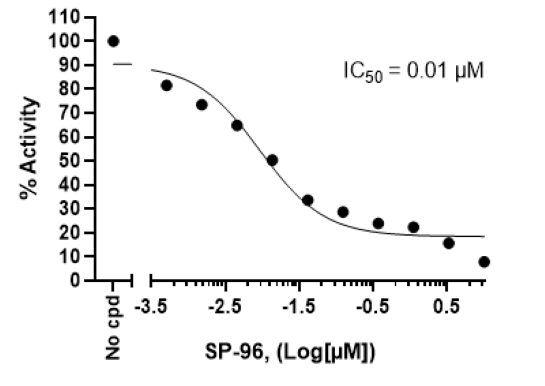Chemi-Verse™ Aurora Kinase B Assay Kit
The Chemi-Verse™ Aurora Kinase B Assay Kit is a luminescence assay designed to measure Aurora Kinase B kinase activity for screening and profiling applications using ADP-Glo™ as a detection reagent. The assay kit comes in a convenient 96-well format, with enough purified recombinant Aurora Kinase B, kinase substrate, ATP, and kinase assay buffer for 100 enzyme reactions.
- ADP-Glo™ Kinase Assay (Promega #V6930)
- DTT (Dithiothreitol) 1M
- Microplate reader capable of reading luminescence
- Adjustable micropipettor and sterile tips
- 30°C incubator
| Catalog # | Name | Amount | Storage |
| 40002 | Aurora Kinase B GST-Tag, His-Tag* | 20 µg | -80°C |
| 79334 | 5x Kinase Buffer 1 | 1.5 ml | -20°C |
| 79686 | 500 µM ATP | 50 µl | -20°C |
| 78514 | Myelin basic protein (MBP), 5 mg/ml | 50 µl | -20°C |
| 79696 | White 96-well plate | 1 | Room Temp |
*The concentration of the protein is lot-specific and will be indicated on the tube.
Aurora Kinase B, also known as serine/threonine-protein kinase 5, is part of the Aurora subfamily. Aurora Kinase B is a CPC (chromosomal passenger complex) protein. It plays a role in microtubule organization during mitosis and meiosis, forming a complex with Survinin, Borealin and INCENP (inner centromere protein) and binding to EB1 (end-binding protein 1). It has a pattern of expression and subcellular localization that varies with the cell cycle stage, in agreement with its role as cell cycle regulator. It has oncogenic activity, being able to lead to the development of cells with abnormal number of chromosomes. Aurora Kinase B also promotes cancer by decreasing expression of p21, hyperactivating CDK1 (cyclin-dependent kinase 1) and regulating class IIa HDACs (histone deacetylase). Interestingly, the use of Aurora inhibitors can result in an increase in the number of chromosome alterations in cancer cells, resulting in cell death, and can also decrease expression of cyclin B1 and D1 and elevate caspase 3 levels in lymphoma cells. Further studies will elucidate the exact mode of action of Aurora Kinase B in cancer development and progression and open new therapeutic avenues.
Tang A., et al., 2017 Oncotarget 8(14):23937-23954.


